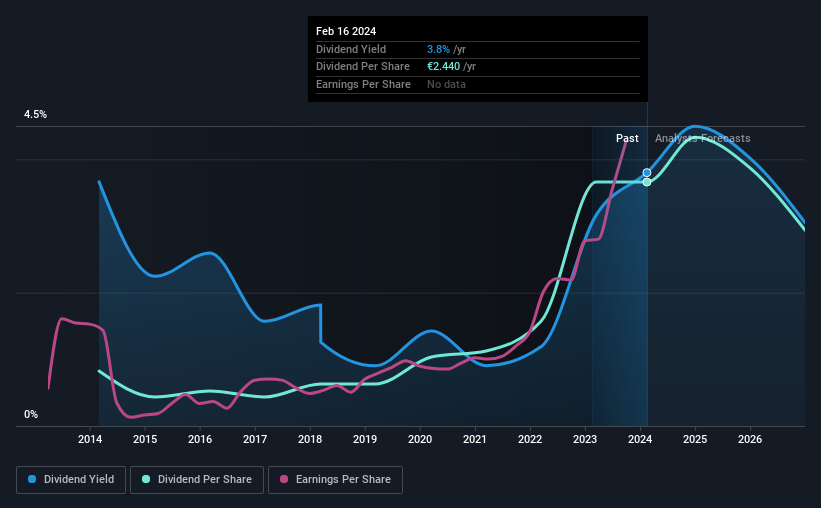- Austria
- /
- Electric Utilities
- /
- WBAG:VER
VERBUND (VIE:VER) Will Pay A Larger Dividend Than Last Year At €4.15
VERBUND AG (VIE:VER) has announced that it will be increasing its dividend from last year's comparable payment on the 17th of May to €4.15. Based on this payment, the dividend yield for the company will be 3.8%, which is fairly typical for the industry.
See our latest analysis for VERBUND
VERBUND Is Paying Out More Than It Is Earning
While it is always good to see a solid dividend yield, we should also consider whether the payment is feasible. However, prior to this announcement, VERBUND's dividend was comfortably covered by both cash flow and earnings. As a result, a large proportion of what it earned was being reinvested back into the business.
Looking forward, earnings per share is forecast to fall by 44.8% over the next year. If the dividend continues along recent trends, we estimate the payout ratio could reach 117%, which could put the dividend in jeopardy if the company's earnings don't improve.

Dividend Volatility
Although the company has a long dividend history, it has been cut at least once in the last 10 years. Since 2014, the annual payment back then was €0.55, compared to the most recent full-year payment of €2.44. This means that it has been growing its distributions at 16% per annum over that time. Dividends have grown rapidly over this time, but with cuts in the past we are not certain that this stock will be a reliable source of income in the future.
The Dividend Looks Likely To Grow
Growing earnings per share could be a mitigating factor when considering the past fluctuations in the dividend. It's encouraging to see that VERBUND has been growing its earnings per share at 53% a year over the past five years. Earnings have been growing rapidly, and with a low payout ratio we think that the company could turn out to be a great dividend stock.
We Really Like VERBUND's Dividend
Overall, a dividend increase is always good, and we think that VERBUND is a strong income stock thanks to its track record and growing earnings. The earnings easily cover the company's distributions, and the company is generating plenty of cash. If earnings do fall over the next 12 months, the dividend could be buffeted a little bit, but we don't think it should cause too much of a problem in the long term. All of these factors considered, we think this has solid potential as a dividend stock.
Companies possessing a stable dividend policy will likely enjoy greater investor interest than those suffering from a more inconsistent approach. Still, investors need to consider a host of other factors, apart from dividend payments, when analysing a company. For example, we've identified 3 warning signs for VERBUND (1 is concerning!) that you should be aware of before investing. If you are a dividend investor, you might also want to look at our curated list of high yield dividend stocks.
New: Manage All Your Stock Portfolios in One Place
We've created the ultimate portfolio companion for stock investors, and it's free.
• Connect an unlimited number of Portfolios and see your total in one currency
• Be alerted to new Warning Signs or Risks via email or mobile
• Track the Fair Value of your stocks
Have feedback on this article? Concerned about the content? Get in touch with us directly. Alternatively, email editorial-team (at) simplywallst.com.
This article by Simply Wall St is general in nature. We provide commentary based on historical data and analyst forecasts only using an unbiased methodology and our articles are not intended to be financial advice. It does not constitute a recommendation to buy or sell any stock, and does not take account of your objectives, or your financial situation. We aim to bring you long-term focused analysis driven by fundamental data. Note that our analysis may not factor in the latest price-sensitive company announcements or qualitative material. Simply Wall St has no position in any stocks mentioned.
About WBAG:VER
VERBUND
Generates, trades in, and sells electricity to energy exchange markets, traders, electric utilities and industrial companies, and household and commercial customers in Austria and internationally.
Excellent balance sheet average dividend payer.
Similar Companies
Market Insights
Community Narratives




